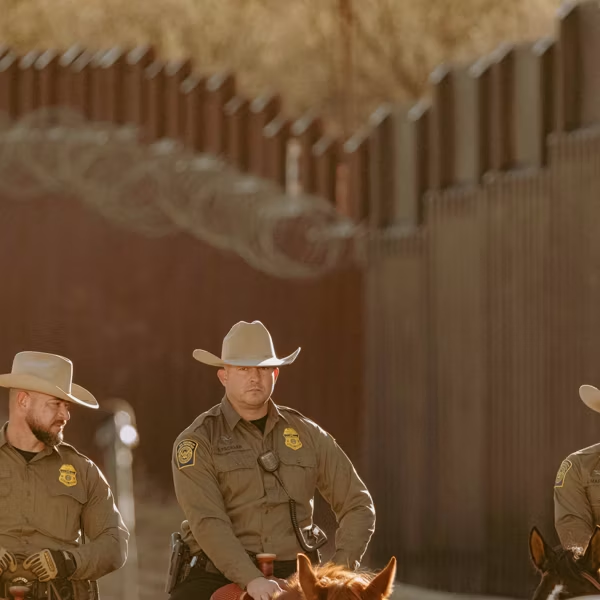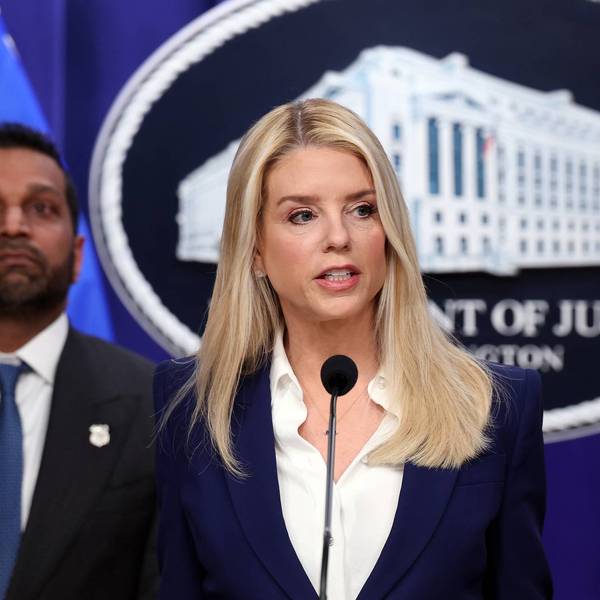First Amendment Win: Supreme Court Rejects Attempt to Block Recording of Police Officers
ACLU of Illinois: "... individuals and organizations must be able to freely gather and record information about the conduct of government and their agents – especially the police."
The U.S. Supreme Court has rejected an appeal from Illinois that allows the enforcement of a law that blocks recording of police officers on duty.
In rejecting the plea from the Cook County state's attorney to review a May 2012 decision, the Court leaves in place "a federal appeals court's injunction against the law, which prohibits audio recording of any part or all of a conversation unless all parties agree to the recording," Josh Gerstein reports.
The Chicago Tribune explains that
The American Civil Liberties Union filed a lawsuit in 2010 against Cook County State's Attorney Anita Alvarez to block prosecution of ACLU staff for recording police officers performing their duties in public places, one of the group's long-standing monitoring missions.
Opponents of the law say the right to record police is vital to guard against abuses.
Last May, a federal appeals court in Chicago ruled that the law "likely violates" the First Amendment and ordered that authorities be banned from enforcing it.
Harvey Grossman, Legal Director of the ACLU of Illinois, stated in response to the Court's decision:
We are pleased that the Supreme Court has refused to take this appeal. Now, we can focus on the on-going proceedings in the federal district court. We now hope to obtain a permanent injunction in this case, so that the ACLU's program of monitoring police activity in public can move forward in the future without any threat of prosecution. The ACLU of Illinois continues to believe that in order to make the rights of free expression and petition effective, individuals and organizations must be able to freely gather and record information about the conduct of government and their agents - especially the police. The advent and widespread accessibility of new technologies make the recording and dissemination of pictures and sound inexpensive, efficient and easy to accomplish.
While a final ruling in this case will only address the work of the ACLU of Illinois to monitor police activity, we believe that it will have a ripple effect throughout the entire state. We are hopeful that we are moving closer to a day when no one in Illinois will risk prosecution when they audio record public officials performing their duties. Empowering individuals and organizations in this fashion will ensure additional transparency and oversight of public officials across the State.
An Urgent Message From Our Co-Founder
Dear Common Dreams reader, The U.S. is on a fast track to authoritarianism like nothing I've ever seen. Meanwhile, corporate news outlets are utterly capitulating to Trump, twisting their coverage to avoid drawing his ire while lining up to stuff cash in his pockets. That's why I believe that Common Dreams is doing the best and most consequential reporting that we've ever done. Our small but mighty team is a progressive reporting powerhouse, covering the news every day that the corporate media never will. Our mission has always been simple: To inform. To inspire. And to ignite change for the common good. Now here's the key piece that I want all our readers to understand: None of this would be possible without your financial support. That's not just some fundraising cliche. It's the absolute and literal truth. We don't accept corporate advertising and never will. We don't have a paywall because we don't think people should be blocked from critical news based on their ability to pay. Everything we do is funded by the donations of readers like you. Will you donate now to help power the nonprofit, independent reporting of Common Dreams? Thank you for being a vital member of our community. Together, we can keep independent journalism alive when it’s needed most. - Craig Brown, Co-founder |
The U.S. Supreme Court has rejected an appeal from Illinois that allows the enforcement of a law that blocks recording of police officers on duty.
In rejecting the plea from the Cook County state's attorney to review a May 2012 decision, the Court leaves in place "a federal appeals court's injunction against the law, which prohibits audio recording of any part or all of a conversation unless all parties agree to the recording," Josh Gerstein reports.
The Chicago Tribune explains that
The American Civil Liberties Union filed a lawsuit in 2010 against Cook County State's Attorney Anita Alvarez to block prosecution of ACLU staff for recording police officers performing their duties in public places, one of the group's long-standing monitoring missions.
Opponents of the law say the right to record police is vital to guard against abuses.
Last May, a federal appeals court in Chicago ruled that the law "likely violates" the First Amendment and ordered that authorities be banned from enforcing it.
Harvey Grossman, Legal Director of the ACLU of Illinois, stated in response to the Court's decision:
We are pleased that the Supreme Court has refused to take this appeal. Now, we can focus on the on-going proceedings in the federal district court. We now hope to obtain a permanent injunction in this case, so that the ACLU's program of monitoring police activity in public can move forward in the future without any threat of prosecution. The ACLU of Illinois continues to believe that in order to make the rights of free expression and petition effective, individuals and organizations must be able to freely gather and record information about the conduct of government and their agents - especially the police. The advent and widespread accessibility of new technologies make the recording and dissemination of pictures and sound inexpensive, efficient and easy to accomplish.
While a final ruling in this case will only address the work of the ACLU of Illinois to monitor police activity, we believe that it will have a ripple effect throughout the entire state. We are hopeful that we are moving closer to a day when no one in Illinois will risk prosecution when they audio record public officials performing their duties. Empowering individuals and organizations in this fashion will ensure additional transparency and oversight of public officials across the State.
The U.S. Supreme Court has rejected an appeal from Illinois that allows the enforcement of a law that blocks recording of police officers on duty.
In rejecting the plea from the Cook County state's attorney to review a May 2012 decision, the Court leaves in place "a federal appeals court's injunction against the law, which prohibits audio recording of any part or all of a conversation unless all parties agree to the recording," Josh Gerstein reports.
The Chicago Tribune explains that
The American Civil Liberties Union filed a lawsuit in 2010 against Cook County State's Attorney Anita Alvarez to block prosecution of ACLU staff for recording police officers performing their duties in public places, one of the group's long-standing monitoring missions.
Opponents of the law say the right to record police is vital to guard against abuses.
Last May, a federal appeals court in Chicago ruled that the law "likely violates" the First Amendment and ordered that authorities be banned from enforcing it.
Harvey Grossman, Legal Director of the ACLU of Illinois, stated in response to the Court's decision:
We are pleased that the Supreme Court has refused to take this appeal. Now, we can focus on the on-going proceedings in the federal district court. We now hope to obtain a permanent injunction in this case, so that the ACLU's program of monitoring police activity in public can move forward in the future without any threat of prosecution. The ACLU of Illinois continues to believe that in order to make the rights of free expression and petition effective, individuals and organizations must be able to freely gather and record information about the conduct of government and their agents - especially the police. The advent and widespread accessibility of new technologies make the recording and dissemination of pictures and sound inexpensive, efficient and easy to accomplish.
While a final ruling in this case will only address the work of the ACLU of Illinois to monitor police activity, we believe that it will have a ripple effect throughout the entire state. We are hopeful that we are moving closer to a day when no one in Illinois will risk prosecution when they audio record public officials performing their duties. Empowering individuals and organizations in this fashion will ensure additional transparency and oversight of public officials across the State.

